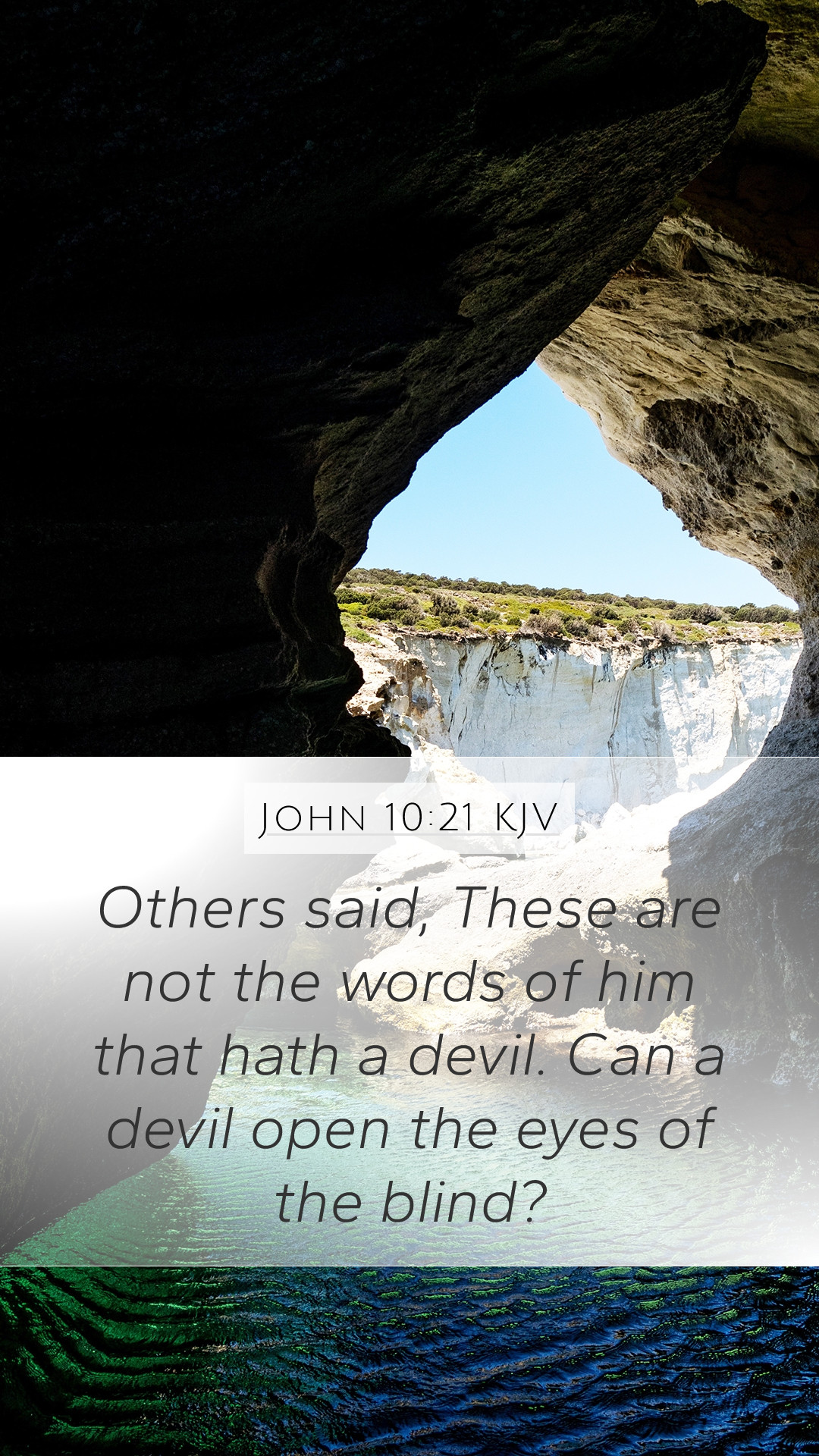Bible Verse Meaning and Commentary on John 10:21
John 10:21 states: “Others said, ‘These are not the words of one who is oppressed by a demon. Can a demon open the eyes of the blind?’” The context of this verse revolves around the authority and identity of Jesus, particularly how He is perceived by the people around Him.
Understanding the Context
This verse follows the profound healing of a man born blind (John 9), showcasing Jesus' miraculous power and divine authority. The response from the crowd demonstrates a divide in belief; while some attribute His acts to demonic influence, others acknowledge the inexplicable nature of His miracles.
Insights from Commentators
-
Matthew Henry:
Henry emphasizes the clarity and decisiveness in recognizing Jesus’ works as being from God rather than from evil influences. Here, he underscores the logical reasoning of the people, asserting that a true servant of God would not perform acts of goodness, like healing and restoration, if under demonic influence.
-
Albert Barnes:
Barnes notes the argument made by the questioning crowd, highlighting their awareness that the actions of Jesus must be understood in the light of who He proclaimed to be. He points out that the miracles of Jesus, notably the healing of the blind man, serve as evidence of His divine commission and authority.
-
Adam Clarke:
Clarke provides a detailed exegesis that focuses on the cultural and spiritual implications of the phrase "open the eyes of the blind." He connects it to Old Testament prophecies concerning the Messiah, affirming that Jesus’ actions fulfill these prophecies and further validate His claim as the Son of God.
Significance of the Verse
The significance of John 10:21 extends beyond its immediate narrative. The verse encapsulates the ongoing debate regarding Jesus' identity, inviting readers to reflect on their understanding of who He is. The reaction of the crowd serves as a reminder of the diverse interpretations of Christ's ministry, where skepticism exists side by side with faith.
This discourse speaks to the broad theme in the Gospel of John, which often juxtaposes belief and disbelief, providing a rich ground for Bible verse interpretations and scriptural analysis.
Application to Daily Life
For modern believers, this verse challenges us to consider our responses to faith-based miracles and teachings. The implications of belief in Jesus can shape our understanding of divine intervention in our own lives. Furthermore, it encourages us to critically assess the words we hear and the claims made about faith and actions.
Bible Study Insights
Incorporating John 10:21 into Bible study groups can facilitate deep discussions about the nature of belief and skepticism in faith contexts. It can serve as a key verse in studies focusing on the miracles of Jesus and their implications for understanding His identity.
Related Bible Verses
- Isaiah 35:5-6: Prophecy about the Messiah opening the eyes of the blind.
- John 9:6-7: The context of Jesus healing the blind man.
- Matthew 12:22-23: A similar situation where Jesus heals a demon-possessed man.
- Luke 7:22: Jesus indicates that the blind see by the evidence of His works.
In-Depth Bible Verse Analysis
This analysis encourages readers to explore how to interpret Bible verses utilizing historical context, theological insights, and practical applications. Understanding the meaning of challenging passages often requires examining surrounding verses, cultural backgrounds, and exegetical principles, which can be discovered through dedicated Bible study tools and resources.
Conclusion
In conclusion, John 10:21 invites believers to understand the profound significance of Jesus’ miracles, the division in belief they incite, and the call to respond with faith rather than skepticism. By engaging with this verse through Bible study lessons and coursework, individuals can deepen their understanding of Scripture and the transformative teachings of Jesus.


